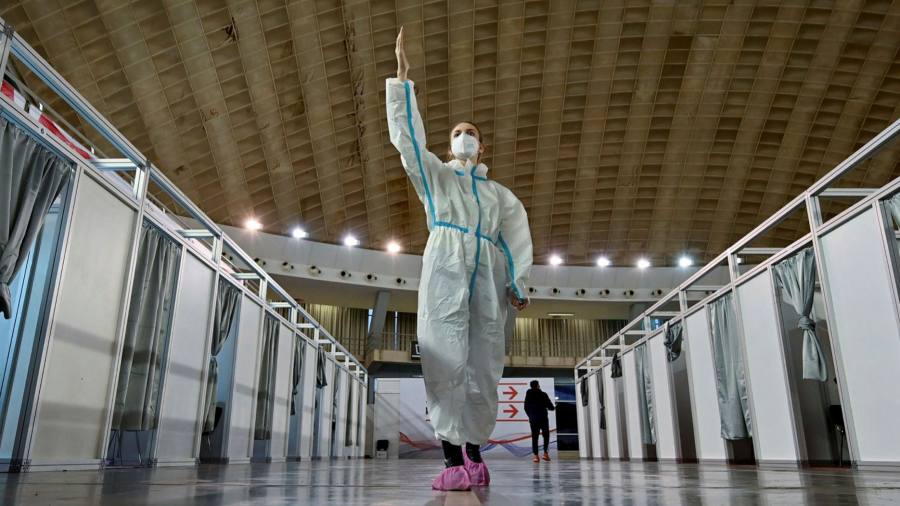[ad_1]
As rancour builds in the EU over delays to its coronavirus vaccination rollout, Serbia has sped ahead to achieve continental Europe’s highest per capita inoculation rate.
But the Balkan state — a candidate to join the bloc — is not using jabs manufactured in the west. Serbia instead has turned to China’s Sinopharm, becoming the first European country to use the company’s shots and its neighbours are set to follow Belgrade’s lead.
“The world has hit an iceberg, like the Titanic, and the rich and the richest only save themselves and their loved ones,†Serbian president Aleksandar Vucic said last week, justifying his decision to purchase Chinese and Russian jabs while also negotiating contracts for EU-approved ones.
“We’re drowning together with the Titanic. It may not be their intention, but it is not particularly important to them.â€
Although the EU has provided €70m to the six Balkan aspiring members to purchase vaccines, procurement problems in Europe mean that four of them have yet to receive any shots months after inoculation began in other countries. Frustrated, some are now looking east to Russia and China to secure scarce supplies.
Some officials warn it could also damage the EU’s credibility in the region. “Someone might use the situation and say that in times of hardships it is China and Russia that help, while the western governments are failing,†said an official in North Macedonia.
Unlike most regional leaders, Serbia’s strongman president has pursued close relations with Beijing and Moscow in tandem with its EU accession process, which has displeased Brussels and Washington.
Serbia, a country of 7m, has already received more than 1m doses, and Mr Vucic said on Saturday that another million would arrive before the beginning of March.
Belgrade’s approach is gaining traction among other countries in the region that had placed their faith in the EU’s distribution plan.
Neighbouring Kosovo and Bosnia and Herzegovina, as well as Nato allies North Macedonia and Montenegro, have still not received a single dose. Officials in Skopje and Podgorica announced last week they were going to buy vaccines from Russia and China.
“We wanted to go for western vaccines to show where we as a country belong, and initially excluded the possibility of negotiating with the Russians and the Chinese,†the official from North Macedonia told the Financial Times.Â
But he said his government was having an increasingly hard time justifying delays. “Since there are other countries in Europe like Hungary who are getting [the Sinopharm vaccine], it would be difficult to explain to people why we are waiting for Pfizer, Moderna and AstraZeneca,†he said, referring to three companies manufacturing EU-approved vaccines.
Montenegro’s health minister Jelena Borovinic Bojovic said that in addition to a recently-signed contract for 150,000 Chinese inoculations, she would seek 50,000 doses of Russia’s Sputnik vaccine. The Bosnian government said in mid-January that it would start negotiations with Moscow, Beijing and Pfizer. Both countries had been waiting on supplies promised by Covax, the multilateral vaccine alliance, that have yet to arrive.
The EU had exempted the Balkans from a new ban on exports of vaccines to non-EU countries. But the bloc’s inability to send even symbolic doses to its aspiring members disappointed them, according to Adi Cerimagic, an analyst at the European Stability Initiative, a think-tank.
“They didn’t expect to receive it at the same time as EU member states, but they expected some kind of a clear timeline, clear arrivals, and now they feel like they are being abandoned,†he said.
In Albania, however, historical mistrust of China and Russia outweighs disappointment in Europe. Albania emerged three decades ago from one of Europe’s most repressive dictatorships, which for many years had been backed by Beijing. Prime Minister Edi Rama said he would steer clear of procuring Russian or Chinese jabs due to a lingering wariness.
But Mr Rama said he was disappointed that his country — which joined Nato in 2009 — had not received even symbolic doses through EU mechanisms. Albania plans to start vaccinating health workers next week with a batch of 970 BioNTech/Pfizer jabs donated by an anonymous European country.
“When it came to the vaccine, I was very badly surprised,†he told the FT in an interview. “It’s not that they [the EU] are in the best shape and they are turning their back to us. It is a whole mess . . . The harm they are doing to themselves is incredible.â€Â
[ad_2]
Source link








